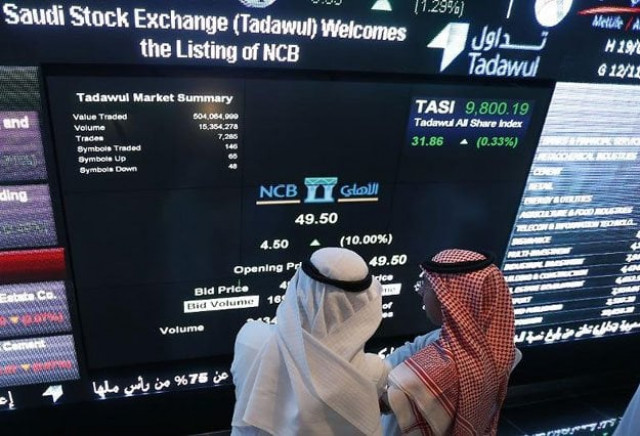Arab world's biggest bourse opens to foreigners in Saudi
Foreign banks, brokerage houses, fund managers and insurance companies based outside the Gulf can now invest directly

PHOTO: AFP
In a notice issued Sunday, the exchange confirmed that "as of Monday... Qualified Foreign Investors can commence dealing in listed shares".
Foreign banks, brokerage houses, fund managers and insurance companies based outside the Gulf can now invest directly provided they meet the requirements.
The measures "could be seen as the first step in a broader liberalisation" of the economy in a country traditionally cautious about foreign political and economic influence, the Capital Economics research group wrote.
Opening of the Tadawul All-Shares Index (TASI) coincides with falling revenues for the kingdom which, despite efforts at diversification, still counts on oil for more than 90 percent of public income.
The International Monetary Fund projects a budget deficit of 20 percent of gross domestic product for Saudi Arabia in 2015 after global oil prices collapsed over the past year.
At the same time, government spending is forecast to remain strong, leaving it facing a deficit of $130 billion (116 billion euros), its first shortfall since 2011.
Foreign exchange reserves have also dropped with oil prices, to $683 billion at the end of April compared with $732 billion four months earlier, Jadwa Investment in Riyadh said.
Read: Saudi Arabian Airlines orders 50 Airbus worth $8bn
The country now depends on foreign currency to fund domestic spending, meaning "an influx of foreign capital on the back of the stock market opening up would help to plug some of the external shortfall and slow the pace at which Saudi Arabia is drawing down its reserves", Capital Economics said.
But analysts did not expect a sudden rush of foreign funds, which will be tightly controlled.
To be registered as a Qualified Foreign Investor (QFI) an overseas institution must have a five-year track record, with at least 18.75 billion riyals ($5 billion, 4.5 billion euros) under management.
Each QFI can hold no more than five percent of a stock, and QFIs and their clients together are limited to 20 percent of any one listed company.
There had already been "a gradual opening up" and Saudi Arabia "will be more competitive" because of the more relaxed controls on foreign capital, said Beshr Bakheet of the privately held Osool and Bakheet Investment Company.
Foreign investors were already able to enter the market indirectly, and founding foreign owners of joint firms, such as The Saudi British Bank, were also permitted.
The market's capitalisation of about $560 billion is more than all of the Gulf's other exchanges combined.
Analysts estimate foreign investment in the market could eventually reach $40-$50 billion, but say the new rules are not about bringing in more money.
"We don't need that in the Saudi market," said Mazen al-Sudairi, head of research at Alistithmar Capital.
He said the kingdom, which is part of the G20 group of the world's largest economies, already has good liquidity and high foreign exchange reserves.
Read: Saudi Arabia unveils plan to construct world's largest hotel in Makkah
Sudairi and others say the main payoff from attracting foreign institutional investors will be improved transparency, accountability, and availability of macroeconomic data, alongside reduced market volatility.
The Capital Market Authority, the chief regulator, cites one more aim from opening the Tadawul.
It seeks "to become a leading market" and move towards obtaining "emerging" status on global indices, CMA spokesman Abdullah al-Kahtani said.
Bakheet said possible inclusion of Saudi Arabia in the MSCI Emerging Markets Index in 2017 would raise the Tadawul's attractiveness, but with a two-year leadup investors will ask "what's the hurry?"
National Bank of Kuwait (NBK), the largest Kuwaiti lender, said Saudi Arabia is currently the only major emerging economy not represented in that index.
The TASI rose less than half a percentage point minutes after opening under the new foreign ownership rules before trading down 0.44 percent at 9,601.99 in mid-session.


















COMMENTS
Comments are moderated and generally will be posted if they are on-topic and not abusive.
For more information, please see our Comments FAQ